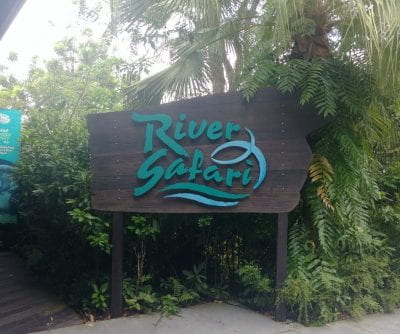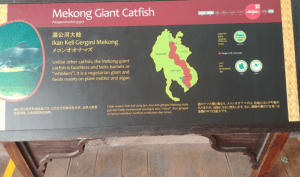Welcome back everyone! Today’s blog post is going to be different, because we are taking a trip to the River Safari (or rather, I did, but I’ll be sharing my experience here hehe)!
This trip was to see if the benefits of zoos to conservation discussed in previous posts are true or not, especially the one on public engagement.
Upon entry into the River Safari, I was first greeted by information on freshwater, followed by some information on freshwater habitats. I suppose this is to make visitors more aware of just how little of Earth’s water is contained in lakes and rivers; yet they support so much life and biodiversity.
Since the exhibits are arranged based on which rivers they emulate, there are accompanying information boards to describe the features of the river, and what threats plague them. For example, this image mentions how the Ganges River is polluted by human activities.
Besides the rivers, each exhibit is accompanied by information on the species featured, and in some of them, they include the risk of extinction faced by the species as indicated in the International Union for Conservation of Nature’s (IUCN) Red List. Some of the exhibits also mentions the threats faced by the species, such as deforestation and dam construction.
 At the end of the walk, there are some boards which details some ways that people can contribute to conservation. Right beside it is also a board that summarizes some threats posed to river-dwelling animals, and encourages people to find out more about freshwater ecosystems (the image was featured in the previous post, so do check it out!).
At the end of the walk, there are some boards which details some ways that people can contribute to conservation. Right beside it is also a board that summarizes some threats posed to river-dwelling animals, and encourages people to find out more about freshwater ecosystems (the image was featured in the previous post, so do check it out!).
Lastly, at the entrance/exit of River Safari are more information boards, that highlights some of the ways River Safari (or rather WRS) contributes to conservation, such as funding conservation projects. It also describes some of the work done by River Safari, and how they care for the animals.
So the golden question: do zoos inspire visitors to do more for conservation?
Based on the little observations that I made (unfortunately there weren’t many other visitors), most visitors merely skimmed through, or did not even read the information boards. They seemed much more interested in snapping photos or looking at the animals instead, suggesting that they are there just for entertainment, and will probably walk away without any new knowledge.
I do think that the message is present, and visitors can be motivated to do more for conservation, especially when they’ve read the information presented. There is, however, room for improvement in terms of conveying the message (such as including more interactive elements); and perhaps providing some avenues for people to learn/do more would be nice too. If the message can be clearly conveyed, then I think the River Safari will do much more for conservation.
That’s all and I hope you’ve enjoyed my reflection of my visit! In the next post we will move on to look at some of the criticisms of zoos, but before we go, let me leave you with a snapshot of Kai Kai enjoying his meal (leading a carefree life that I also wish to have). 😀

Cheers!
Jeng Wei
All images used in this post were taken by me 🙂 So please pardon the poor quality I’m not good at taking photos







Sarah-Ann Tham October 3, 2020
Hi Jeng Wei! I’ve never been to the River Safari before and reading your post definitely made me want to visit it!
You mentioned that visitors might just come to the River Safari for entertainment purposes. While I do agree that more could be done to engage visitors, could this also be due to what visitors perceive the zoo to be (e.g merely another place in Singapore to visit or to see cute animals)? I would love to hear your thoughts!
Jeng Wei October 3, 2020 — Post Author
Hi Sarah!
Glad to see that you are interested in heading over to the River Safari after reading my post, and thanks for the question! I think that the perception of the individual will play an important role in shaping his/her experience. This article suggests that the reality that one experiences is shaped around one’s perceptions. In the context of zoos, I would think that an individual who perceives the zoo as a place purely for entertainment would likely not learn anything even if learning opportunities are present, because it does not fit in with his/her reality and they would thus not be interested. Conversely, an individual who sees the zoo as a place to learn more about animals may actively try to seek out information about the animals, and would probably walk away learning much more than the aforementioned individual. While perceptions can shape experiences, the opposite is also true, and one’s experiences can also change their perceptions. I think this is where the interactive elements can come into play, to better engage with visitors, and perhaps even give them an experience that can change their perceptions. Of course, this is just my perspective and is purely speculative, so hey I could be wrong! Thanks again for visiting, and see ya next time!
Cheers!
Jeng Wei
Joanna Coleman October 8, 2020
Hi Jeng Wei,
Overall, great post. Love that you include some primary research. That said, please allow me to give you some constructive criticism, which you will hopefully share here.
Let me reiterate that I love what you did. But…
1. Tell us how many people you observed.
2. Tell us their approximate ages.
3. Describe how adults interacted with kids around these panels.
4. Consider standing to the side, pretending to do something else (like texting) on your mobile, while really, you’re timing how long visitors spend at the panels. Compare the avg time spent with how long it takes you to fully read the same panel.
5. Eavesdrop on ppl to hear what they’re saying and document that on your mobile.
Would love to have you do this study “for real”, like maybe as a UROPES. Would be fun, no ?
Jeng Wei October 8, 2020 — Post Author
Hi Dr Coleman!
Thank you so much for your feedback! I must admit, this being my first time trying out primary research, that I wasn’t really all that sure on what I should be doing, so I ended up just winging it. Regardless, this trip was a great learning experience for me when it comes to conducting primary research (such as being clear on what kind of data I want to collect, and the methodology for gathering them). I really appreciate your feedback too, and will certainly take that into account the next time I conduct primary research, to be super clear in presenting the data that I collected. I think doing a UROPES on this will definitely be a fun and fulfilling experience, and I’ll give it some thought! Again, thank you so much for your comment Dr Coleman!
Cheers!
Jeng Wei
Joanna Coleman October 15, 2020
You’re welcome !
Btw, one of the advantages to using the kind of methods I described (amounting to direct observation) is you don’t need human-ethics approval because you’re not collecting any personal data. Not that I’m saying it’s a loophole or anything, just that when we use tools like surveys or interviews, there are more considerations, including the need to obtain consent, and those can be barriers depending on our research Qs.